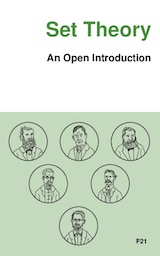
|
FreeComputerBooks.com
Links to Free Computer, Mathematics, Technical Books all over the World
|
|
- Title Set Theory: An Open Introduction
- Author(s) Richard Zach
- Publisher: Open Logic Project
- License(s): CC BY 4.0
- Paperback 260 pages
- eBook HTML and PDF
- Language: English
- ISBN-10/ASIN: B09KN65FFQ
- ISBN-13: 979-8753831101
- Share This:

|
This book is a brief introduction to the philosophy of set theory. It is written for students with a little background in logic, and some high school mathematics, aims to scratch the tip of the surface of the philosophy of set theory. By the end of this book, students reading it might have a sense of:
- why set theory came about;
- how to reduce large swathes of mathematics to set theory + arithmetic;
- how to embed arithmetic in set theory;
- what the cumulative iterative conception of set amounts to;
- how one might try to justify the axioms of ZFC.
- Richard Zach is Professor of Philosophy at the University of Calgary, Canada. He works in logic, history of analytic philosophy, and the philosophy of mathematics.
- Mathematical Logic - Computability, Set Theory, Model Theory, etc
- Theory of Computation and Computing
- Computational Complexity
 Similar Books:
Similar Books:
-
 An Introduction to Set Theory (William A. R. Weiss)
An Introduction to Set Theory (William A. R. Weiss)
This book covers the basics: relations, functions, orderings, finite, countable, and uncountable sets, and cardinal and ordinal numbers, gives students sufficient grounding in a rigorous approach to the revolutionary results of set theory.
-
 Axioms and Set Theory (Robert Andre)
Axioms and Set Theory (Robert Andre)
This book provides a very clear and well-developed approach. It covers axioms and set theory for the mathematics student on the upper undergraduate or graduate level. Throughout, emphasis is on axioms and theorems; proofs are informal.
-
 Sets, Logic, Computation: An Open Introduction to Metalogic
Sets, Logic, Computation: An Open Introduction to Metalogic
It covers naive set theory, first-order logic, sequent calculus and natural deduction, the completeness, compactness, and Löwenheim-Skolem theorems, Turing machines, and the undecidability of the halting problem and of first-order logic.
-
 Set Theoretic Approach to Algebraic Structures in Mathematics
Set Theoretic Approach to Algebraic Structures in Mathematics
This book brings out how sets in algebraic structures can be used to construct the most generalized algebraic structures, like set linear algebra / vector space, set ideals in groups and rings and semigroups, and topological set vector spaces.
-
 Fundamentals of Model Theory (William Weiss, et al)
Fundamentals of Model Theory (William Weiss, et al)
This book is a concluding discussion focuses on the relationship between proofs and formal derivations, and the role proofs may play as part of a general theory of evidence. It is a primer which will give someone a self contained overview of the subject.
-
 Introduction to Mathematical Logic (Vilnis Detlovs, et al)
Introduction to Mathematical Logic (Vilnis Detlovs, et al)
This book explores the principal topics of mathematical logic. It covers propositional logic, first-order logic, first-order number theory, axiomatic set theory, and the theory of computability. Discusses the major results of Gödel, Church, Kleene, Rosser, and Turing.
-
 A Friendly Introduction to Mathematical Logic (Chris Leary)
A Friendly Introduction to Mathematical Logic (Chris Leary)
In this user-friendly book, readers with no previous study in the field are introduced to the basics of model theory, proof theory, and computability theory, leading to rigorous proofs of Gödel's First and Second Incompleteness Theorems.
-
 Introduction to Mathematical Philosophy (Bertrand Russell)
Introduction to Mathematical Philosophy (Bertrand Russell)
Requiring neither prior knowledge of mathematics nor aptitude for mathematical symbolism, the book serves as essential reading for anyone interested in the intersection of mathematics and logic and in the development of analytic philosophy.





